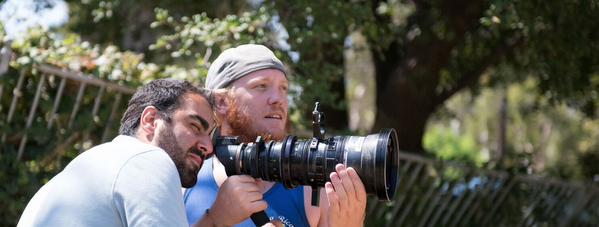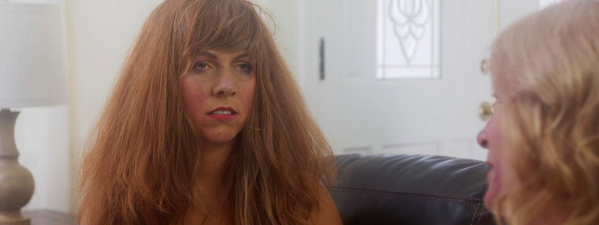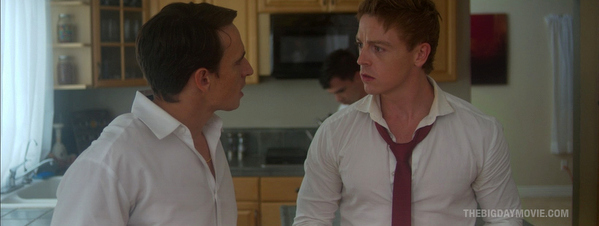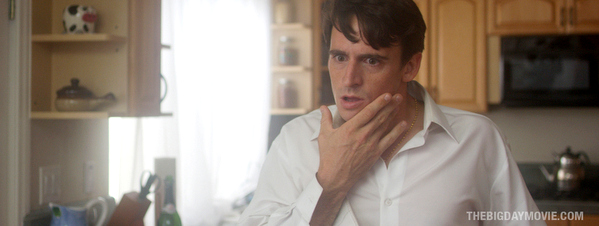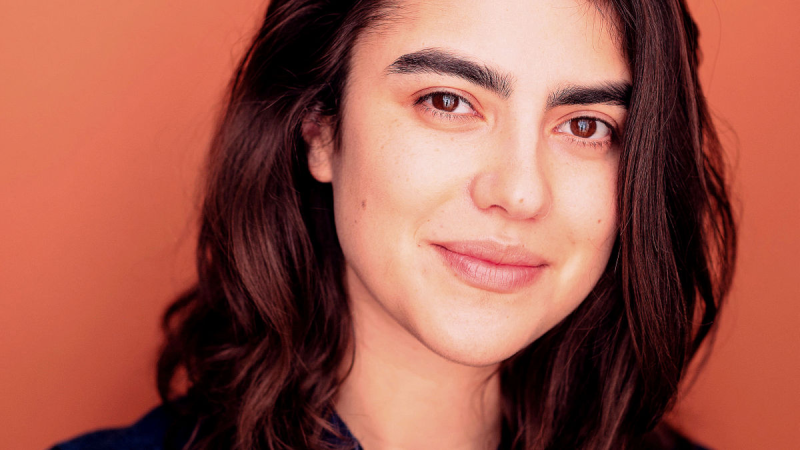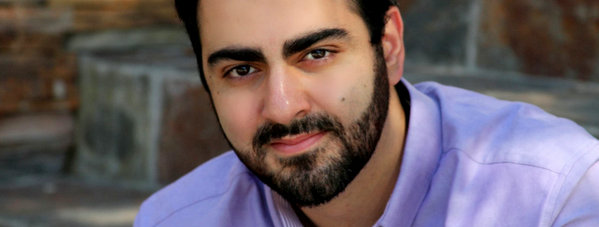
I was born in Iran, and moved to America when I was nine years old. Being the new kid in school is tough — and it’s even tougher when you don’t speak any English. Between everything that was going on, movies became my source of escape from reality. I loved watching movies. For two hours, the real world disappears, and you can let yourself be taken into a new world. To say that I became a film fanatic is an understatement.
Eventually, I realized that I didn’t want to just watch movies, I wanted to make them. So, after high school, I went to Chapman University’s film school where I studied directing. Not long after graduation my producing partner, Melissa Izbicki, and I decided to put it all on the line, drop everything (including quitting our day jobs) to make our first feature film. We spent two years perfecting the script and calling in every favor we could to make the film a reality. The result is The Big Day — a film we’re proud to share with everyone in the coming months.
Sometimes you have to drop everything to follow your passion. That’s what we did on #TheBigDayMovie #WednesdayWisdom pic.twitter.com/NTlIw0OuKW
— The Big Day Movie (@TheBigDayMovie) May 11, 2016
How would you describe your work as a director
My favorite part of directing is working with actors; bringing out the right emotions, at the right time, and really working with them to take a scene to the next level. It’s amazing how a few simple words or the right direction can bring out an entirely new dynamic to an actor’s performance.
As a director I am all about the character’s emotions, the story, and the plot. When it comes to the visual art of filmmaking, I’m a little more subtle. I love long one takers. If I can combine multiple amazing moments into an epic one taker that keeps the audience on the edge of their seat, then I’ve done my job well! I feel like the Steadicam was invented for people like me!
How did you get into directing
It’s funny, because I feel like I can narrow down this moment to first time I watched Bryan Singer’s The Usual Suspects. My mind was blown! I watched the film over and over, trying to figure out why this film stood out to me more than all of the others I had watched. Between the characters, the plot, the plot twist, and the visuals, it seemed impossible to narrow it down. It was just an amazing movie. Shortly after, the first X-Men film was released, and again, I was blown away. X-Men did something that no one else had done. The film took this sci-fi, comic-book world and merged the story with everyday life and relatable problems. The first two X-Men films metaphorically compare the mutants’ experiences with the racism, bigotry, and homophobia so many individuals face in the real world. Watching these films got me thinking. These two movies really represented what I truly loved about films…. but what do they have in common? And then it hit me — the director! At that point, I had no idea what a director really did. But eventually I did some research and realized, “YES! This is what I want to be doing!”
#SupportIndieFilm and take a moment to #like @TheBigDayMovie on Facebook: https://t.co/LwOcbnFCgx …Please?! pic.twitter.com/OMU6h6u7nE
— Arian Harandi (@ArianHarandi) May 8, 2016
How do you choose a project to direct
I’m still starting out, so I can’t be too picky. As long as I have a chance to do what I love, I’m happy, and I’ll do my best at it. But I have already learned that if a script is not in your style, you will quickly clash with the project. If I can’t get excited about a story, then I should walk away.
Briefly describe in a few words wrong impressions actors, writers,and directors have about directing
Some actors don’t realize that the director has the whole film in their head! If you come up with a fun moment for your character, more often than not, the director will love it and add it into the film. But if the director says that it doesn’t work, it’s not that he is stomping on your creativity, it’s that it could be conflicting with something that happens later in the film, or some other type of conflict of which you may not be aware. So if the director shuts down an idea you had for your character, please just know it’s not that it isn’t good, or that your idea wasn’t creative. It’s just that it may not work correctly with the director’s vision. I absolutely cannot stand it when a writer includes camera angels, close up, and/or cuts!
Directing is a collaborative art form. I feel like some directors forget this — especially when you see a film that’s written by, directed by, produced by, and shot by the same person. Directing is a lot of hard work. Don’t try do everything in a movie yourself. Let others do what they’re good at.
Do you take courses to increase your craft
I graduated Chapman University where I was fortunate enough to work with a lot of great industry professionals. Andy Lane taught me the art of working with actors. John Badham taught me how to be more visual with my projects. Overall, I feel that my experience there took me from “some kid with a camera” to an actual filmmaker.
What books do you read
I read a lot, and I mostly read narrative fiction. I love storytelling and I love a book that tells a great story. I don’t normally read film industry books, but when we were in pre-production on The Big Day, I started to feel a little overwhelmed. So, my producer (and now fiancé) bought me Kevin Smith’s book “Tough Sh*t,” which was a truly great book to read at just the right time in my life! It was truly inspiring, and really gave me the kick in the pants that I needed to concentrate on The Big Day.
Why will you choose an actor, writer or producer. What do you look for
When it came to actors, we saw at least fifty people (if not more) for each role in our film The Big Day. What makes a particular actor stand out in the audition room is what they bring to the role. What makes me want to work with an actor again, is what they bring to set! There are actors that I cannot wait to work with again, and that’s because of the level of professionalism and excitement they bring to set!
I enjoy working with writers that can add something original and creative to the story. I worked on the script for The Big Day a long time, but I still felt that something was missing. So I reached out to a writer friend of mine, who I had worked with on shorts before. I asked him to take a stab at it, and he added his own unique style of humor, which ended up being exactly what The Big Day needed!
A good producer is there for me. A good producer knows when to fight for me, and when to tell me to back down. If you give a director full creative freedom, they will run a muck! They will always go overboard! But a good producer knows when it’s right to go overboard, and when it’s time to pull it back.
When you are offered a job, what things do you put in place
A strong cast and crew. As I mentioned earlier, film is a collaborative art form. Having the right people, in the right jobs, improves so many aspects of a film and, ultimately, makes it so much easier to do what I do best — direct.
Briefly explain your latest work
The Big Day is our first narrative feature film! It’s currently in post-production, and is schedule for completion in late July. After we graduated college, it didn’t take long until we realize that no one was just going to hand us a million dollars to make a movie. Film financiers required experience (which is impossible to get without the money), and regular investors required A-list actors (who are also impossible to get without money). It’s a vicious cycle that is seemingly impossible to break.
Eventually we decided to just go out and do it. We made a calculated risk — invested what little savings we had and called in every favor we could! We worked on the script for about two years; perfecting the characters, the plot, the jokes and writing the story around the budget we knew we had. When it came time to make the film, we looked for fellow artists who loved the project as much as we did. And it all came together very well. I’ve included a synopsis below.
Synopsis: The Big Day opens hours before an elegant wedding when the groom-to-be realizes that the stripper from the bachelor party the night before is actually a hooker. Having slept with one of the groomsmen, she refuses to leave the wedding venue until she is paid.
With no cash to be found, the groom and his groomsmen attempt to hide the prostitute from the bride, her father, and her eccentric bridesmaids in an effort to save the wedding. Their efforts are thwarted, however, at the arrival of the hooker’s pimp, whose outlandish financial demands put the groom’s wedding, relationship, and life in jeopardy.
What thing/situation helps you during production
The biggest “help” I had on The Big Day was being surrounded by a group of people that truly believed in the project. Our cast and crew were truly amazing people who treated the project as their own. That helped the production move smoothly, inspired creativity and ensured that everyone had a great time while working.
Explain a creative choice you took on set on a recent production
There is a specific moment in The Big Day when everything is falling apart for our characters; everyone is fighting, everyone is in each other’s face, and it seems that all hope is lost. I wanted to create a moment that allowed the audience to almost be in the shoes of our main character and feel his confusion/frustration. I can’t tell you the specifics — you’ll have to watch the film — but the creative choice involves a really awesome series of shots that I’m very proud of.
How do you advise directors to find projects
Find the story you want to tell, and make sure it can be done on a low budget. Don’t waste too much money on the first few projects. Show the world you are good at what you do, and then go out there and do it.
Just hanging out in video village with @MelissaIzbicki and @ArianHarandi #SetLife #SupportIndieFilm #TheBigDayMovie pic.twitter.com/WqNkHeekJL
— The Big Day Movie (@TheBigDayMovie) January 15, 2016
How can filmmakers finance projects
Isn’t that the biggest struggle faced by all independent filmmakers? The sad truth is that nobody cares about how talented you are unless you have the proof that your talent can make a profit. So for first time filmmakers, I would say, take your time and make something on a low budget. Don’t go overboard. Try to realize your limitations, and write the script around those limitations. So many times microbudget films try to put in huge explosions, and car chases, etc. When you try to do that type of thing on a low budget, it makes your film look cheap and unprofessional.
What do you want from an actor in production
Be prepared. Know your lines, and know your character. And then creativity and cooperation. I want to know what you think, why you would do things a certain way. But cooperation is also very important. As a director, I will always listen and consider what my actors say and want, but if I truly feel that it isn’t right and it doesn’t work then we don’t do it. So what I expect from my actors during production is to listen to me, even if they disagree. As an actor it is your job to figure out how to work with and pull off what I need. You need to trust your director, or walk away from the project.
How do you prefer to work with a producer during a production
I work very closely with my producer, Melissa Izbicki, who also happens to be my fiancé! We work very well together and she’s amazing at what she does. As a storyteller, she has a unique talent for pinpointing what doesn’t work in a script and usually provides helpful insight as to how to fix a problem with a scene or character. She also has an amazing ability to stretch a dollar. I’m sure some production executives would be shocked if I told them how little cash we actually spent on The Big Day.
What do you think a director can do to get into the film industry
Never give up. Keep at it, keep doing what you are passionate about. I’m not saying that I am doing things the right way, I’m not saying that there is a right or wrong way, but I do know that what separates the successful from the failures is persistence. Keep working at it, keep getting better at what you do, and one day you will figure out what’s right for you.
Who is your favorite director
Bryan Singer. As I mentioned before, The Usual Suspects and the first X-Men are both films that inspired me to become a director. I really admiring his directing style, and I hope to get the opportunity to make similar films in the future. My other favorite directors include Peter Berg, and of course, arguably one of the greatest director of all time, Martin Scorsese.
Why this director
I can pinpoint the moment that I realized Bryan Singer was my favorite director. I loved the first two X-Men films and was excited to see the third when it was released. I was incredibly disappointed, however, when I watched the third film of the franchise. It was the same universe and same characters — but the film just really fell flat for me. I remember asking myself what the difference between the first two films and the third film was — and that’s when I realized it was Bryan Singer. He had directed the first two films, but not the third. I just really enjoy his directing style, and what he brings to a project. He makes the type of films I enjoy, and I hope to eventually make similar films.
What advice would you give to directors around the world
Be passionate about your art or look for something else. I know too many fellow filmmakers who didn’t reach their goals in the first five or so years, so they moved on, and are now doing something completely different. There’s nothing wrong with that — they’re successful at their new careers, but they have given up on the film industry. So if you don’t have what it takes to stick it out for the long haul, struggle for your passion, be broke to try to do what you love, then directing is probably not right for you!
Briefly write about your career
My biggest achievement to date is The Big Day. You can find out more about the movie at www.TheBigDayMovie.com or on our Official Facebook Page. Apart from that, I have had a chance to direct a few shorts that I am very proud of, including one that features a four and a half minute long, one taker action sequence. You can check out my work at www.ArianHarandi.com
INTERVIEWS
more interviews

